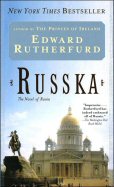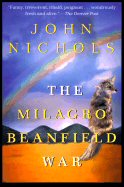Benny's Book Review: Four for the Price of One
June 22, 2007
Having spent close to a month in Russia, mostly without TV and almost entirely without newspapers, magazines, or internet, I got a lot of book reading done. Here are my thoughts.

The Dark Heart of Italy, by Tobias Jones
Here's the crux of this book: an Englishman moves to Italy, and then pens a book about how corrupt and backwards Italy is. Sounds like it might be interesting, but it is really very very very far from interesting. Unless you have some strangely acute interest in the nuances of politics of Italy, you will agree with me that this is a terrible fucking book.

Russka, by Edward Rutherfurd
This is a new type of book for me. It tries to teach the reader a bit of Russian history, though information given in the course of a fictional narrative.
Some of my favorite novels have taught me a bit of history by accidentally including (or even possessing me to research) background history that's relevant to the story. For example, everything I know about Europe's trade with China in the 1700's and 1800's came from looking up details about things alluded to in James Clavelle's novels.
This book is a little different, as its primary purpose was to educate. The story isn't terrible, but one plot narrative can't possibly span the thousand years covered in this novel, even given its more than 900 page heft. What you get instead is a series of short soap-operas, joined by generational ties and coincidence.
This isn't to say that it was bad. It was a decent read. And it certainly beat the hell out of trying to read Russian history directly. So if you're interested in learning some Russian history, give it a whirl. If you're looking for a good book, give it a pass.

Kafka on the Shore, by Haruki Murakami
This is the second of Murakami's novels that I've read, and it seems to me that he might be the novel equivalent of the Coen brothers. weird but good. And this is indeed a weird-ass book.
I don't know how to summarize this without typing a lot more text than anyone wants to read, but I'll give it a try.
There are two converging stories going on. In one, a teenage runaway runs into odd characters and ends up in weird places. He sometimes talks to a character that he either imagines or is some sort of spirit, and he has some odd episodes as he travels.
The other story is way more strange. It involves a retarded man who has some special powers. Presumably he got these powers as a child when he went from normal to retarded during a strange incident during World War II. He ends up murdering someone who might be a real person or might be some sort of spirit, and this sets him off on a journey that he feels he has to take.
As I feared, this is a really crappy explanation Bottom line: this is worth the short time that it takes to read.
One warning: like the other Murakami book that I read, this one throws you a lot of mysterious things, and doesn't get around to explaining them all. It's a little disappointing when it ends. There are enough clues to let your mind make up a plausible explanation, but if you need the author to lay it all out nice and clean, you won't get it here.

Milagro Beanfield War, by John Nichols
I've never read John Nicols before, and I'm actually not finished with this even though I started it on my trip. But what great writing! I can't remember a book where I read a paragraph and enjoyed it so much that I go back to the beginning and read it again.
The old man coughed, scratched his balls, snagged a coffeepot with one arthritic paw, and shuffled over to the hand-dug well. Letting the bucket drop slowly into the water thirty feet below, he only a quarter filled it, then slowly, resting after each tug, pulled the bucket up and tipped some water into the coffeepot, which he carried back and set atop the heater. Next, he proceeded cautiously around his dwelling to the backyard outhouse. And while he camped there with door open so he could watch the turquoise-silver bluebirds flying about his crumbling farmhouse, he also slowly and shakily, though in the end expertly, rolled a cigarette and lit it, contentedly puffing away as he crapped.
Isn't that great?
The dialog is entertaining too.
The story is of a renegade guy in a small town who plants a bean field, despite not having water rights. But it's just a vehicle to move through a great assortment of tangential tales and eccentric characters.
This is an excellent book.